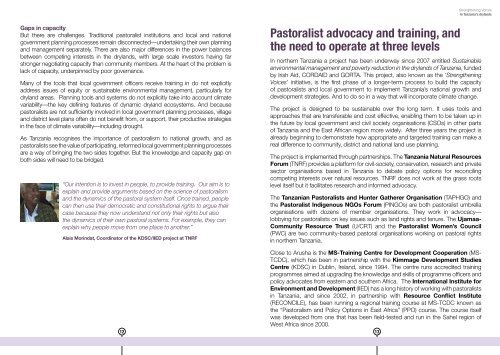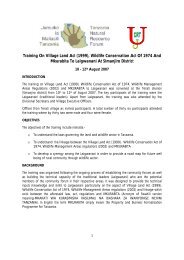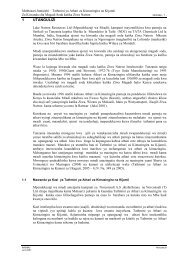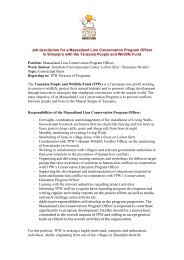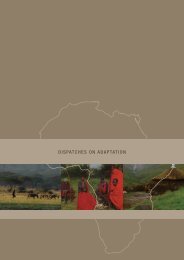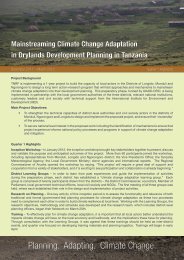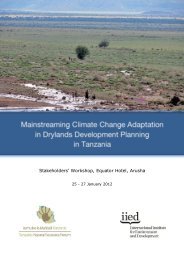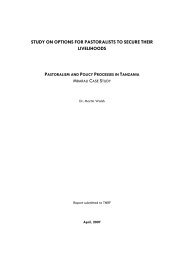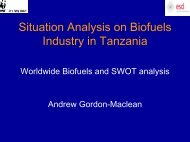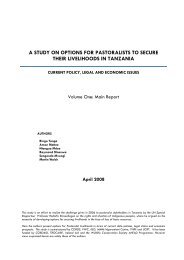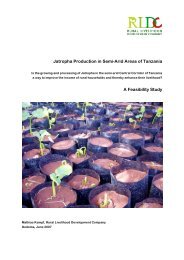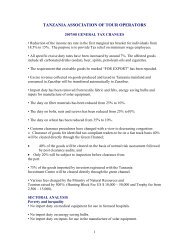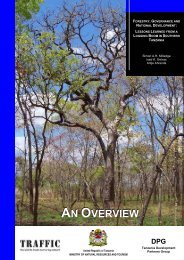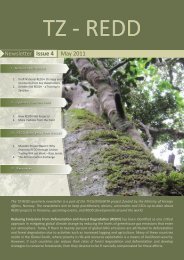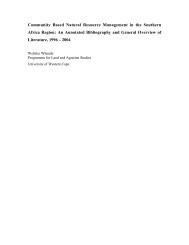Strengthening Voices
Strengthening Voices: - IIED pubs - International Institute for ...
Strengthening Voices: - IIED pubs - International Institute for ...
Create successful ePaper yourself
Turn your PDF publications into a flip-book with our unique Google optimized e-Paper software.
<strong>Strengthening</strong> <strong>Voices</strong><br />
in Tanzania’s drylands<br />
Gaps in capacity<br />
But there are challenges. Traditional pastoralist institutions and local and national<br />
government planning processes remain disconnected—undertaking their own planning<br />
and management separately. There are also major differences in the power balances<br />
between competing interests in the drylands, with large scale investors having far<br />
stronger negotiating capacity than community members. At the heart of the problem is<br />
lack of capacity, underpinned by poor governance.<br />
Many of the tools that local government officers receive training in do not explicitly<br />
address issues of equity or sustainable environmental management, particularly for<br />
dryland areas. Planning tools and systems do not explicitly take into account climate<br />
variability—the key defining features of dynamic dryland ecosystems. And because<br />
pastoralists are not sufficiently involved in local government planning processes, village<br />
and district level plans often do not benefit from, or support, their productive strategies<br />
in the face of climate variability—including drought.<br />
As Tanzania recognises the importance of pastoralism to national growth, and as<br />
pastoralists see the value of participating, reformed local government planning processes<br />
are a way of bringing the two sides together. But the knowledge and capacity gap on<br />
both sides will need to be bridged.<br />
“Our intention is to invest in people, to provide training. Our aim is to<br />
explain and provide arguments based on the science of pastoralism<br />
and the dynamics of the pastoral system itself. Once trained, people<br />
can then use their democratic and constitutional rights to argue their<br />
case because they now understand not only their rights but also<br />
the dynamics of their own pastoral systems. For example, they can<br />
explain why people move from one place to another.”<br />
Alais Morindat, Coordinator of the KDSC/IIED project at TNRF<br />
12<br />
Pastoralist advocacy and training, and<br />
the need to operate at three levels<br />
In northern Tanzania a project has been underway since 2007 entitled Sustainable<br />
environmental management and poverty reduction in the drylands of Tanzania, funded<br />
by Irish Aid, CORDAID and GORTA. This project, also known as the ‘<strong>Strengthening</strong><br />
<strong>Voices</strong>’ initiative, is the first phase of a longer-term process to build the capacity<br />
of pastoralists and local government to implement Tanzania’s national growth and<br />
development strategies. And to do so in a way that will incorporate climate change.<br />
The project is designed to be sustainable over the long term. It uses tools and<br />
approaches that are transferable and cost effective, enabling them to be taken up in<br />
the future by local government and civil society organisations (CSOs) in other parts<br />
of Tanzania and the East African region more widely. After three years the project is<br />
already beginning to demonstrate how appropriate and targeted training can make a<br />
real difference to community, district and national land use planning.<br />
The project is implemented through partnerships. The Tanzania Natural Resources<br />
Forum (TNRF) provides a platform for civil-society, conservation, research and private<br />
sector organisations based in Tanzania to debate policy options for reconciling<br />
competing interests over natural resources. TNRF does not work at the grass roots<br />
level itself but it facilitates research and informed advocacy.<br />
The Tanzanian Pastoralists and Hunter Gatherer Organisation (TAPHGO) and<br />
the Pastoralist Indigenous NGOs Forum (PINGOs) are both pastoralist umbrella<br />
organisations with dozens of member organisations. They work in advocacy—<br />
lobbying for pastoralists on key issues such as land rights and tenure. The Ujamaa-<br />
Community Resource Trust (U/CRT) and the Pastoralist Women’s Council<br />
(PWC) are two community-based pastoral organisations working on pastoral rights<br />
in northern Tanzania.<br />
Close to Arusha is the MS-Training Centre for Development Cooperation (MS-<br />
TCDC), which has been in partnership with the Kimmage Development Studies<br />
Centre (KDSC) in Dublin, Ireland, since 1994. The centre runs accredited training<br />
programmes aimed at upgrading the knowledge and skills of programme officers and<br />
policy advocates from eastern and southern Africa. The International Institute for<br />
Environment and Development (IIED) has a long history of working with pastoralists<br />
in Tanzania, and since 2002, in partnership with Resource Conflict Institute<br />
(RECONCILE), has been running a regional training course at MS-TCDC known as<br />
the “Pastoralism and Policy Options in East Africa” (PPO) course. The course itself<br />
was developed from one that has been field-tested and run in the Sahel region of<br />
West Africa since 2000.<br />
13


